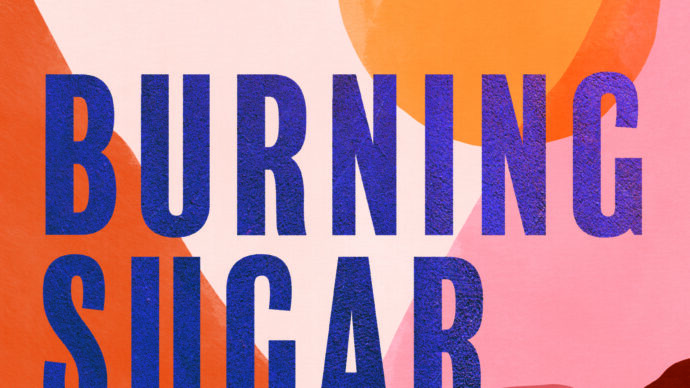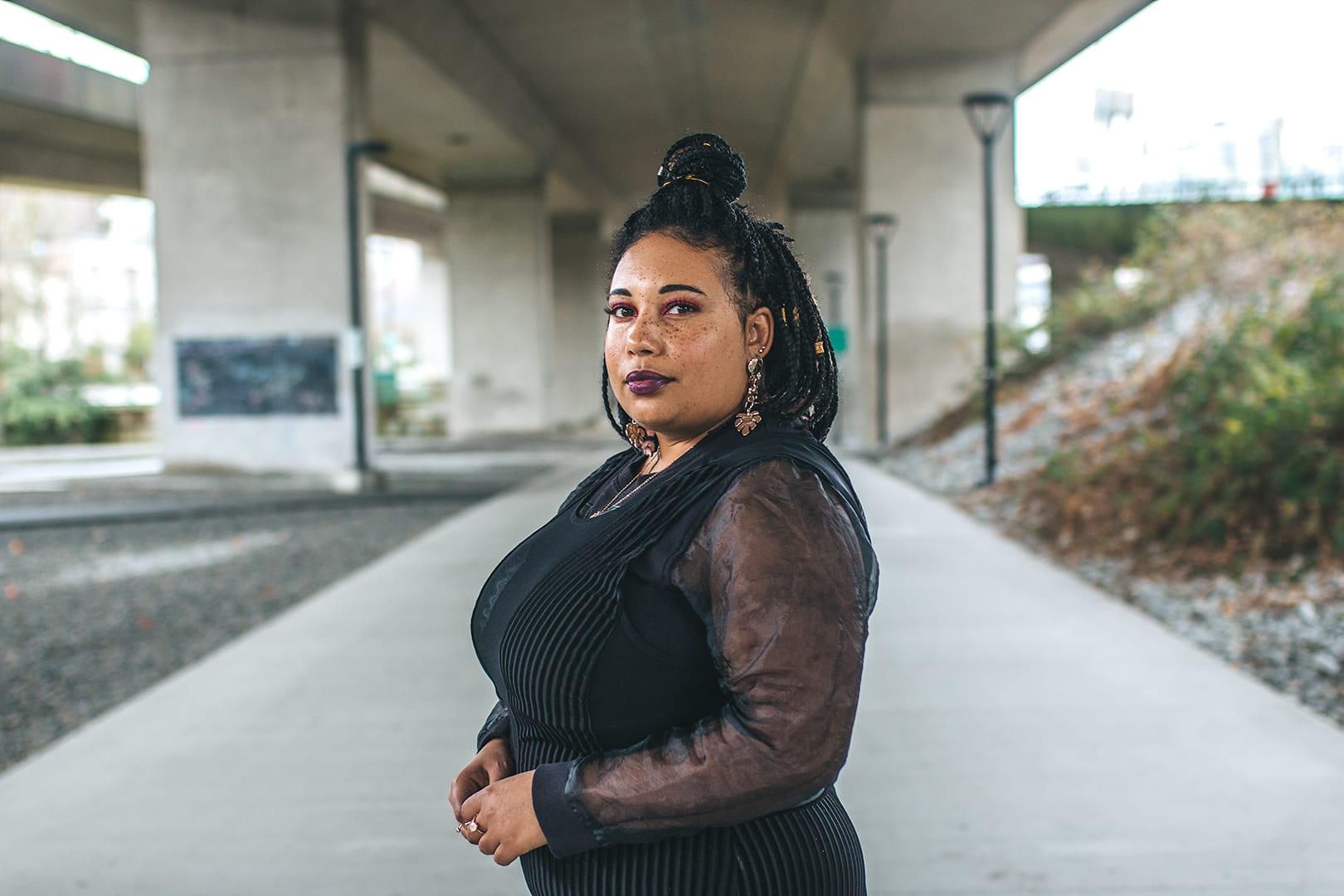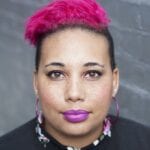In their forthcoming collection, Burning Sugar, Cicely Belle Blain revisits familiar spaces—some geographic, some institutional, some internal—to reflect on issues of identity, injustice, racism and queerness. And in their essay “Toronto,” they take stock of what a Black queer- and trans-inclusive Pride looks like. Below, in this early excerpt from Burning Sugar, Blain recounts moments at Toronto Pride, and the balance of protest and celebration, anger and joy, fight and flight.
It’s 3 a.m. I’m sitting on a balcony at the corner of Dundas and Gladstone—the neighbours are playing late 80s alt rock, and the air smells like smoke and chocolate. My rainbow platform sandals, half a joint and a flag striped pink-white-blue lie around me like an altar to my queer liberation. Marsha P. Johnson is pinned in enamel to my lapel—brown skin and flower crown immortalized on my chest. A wind blows the pages of the Toronto Pride Guide open and closed like an accordion—rainbows, glitter and unicorns practically exalt from the pages. I’m not usually that kind of queer, but tonight I am.
I often think about my relationship with fight or flight. Am I more likely to attack—run headfirst into conflict? Or will I flee, taking any opportunity to escape my fears? Perhaps both, I’ve concluded now. When things become too much, my first thought is escape. My browser is thirty flight-search tabs wide, my suitcase is never quite unpacked and my passport doesn’t live in a safe or secure hideaway but on the bookshelf along with my other prized and well-read books. For many nights, my cursor will hover over the “Book” button, but it will be months before I click it. Instead, without even really thinking about it, I’ll fight. I will get up every morning with the weight of injustice in my body, and I will resist. Mostly in small ways—by picking out my afro for a corporate meeting or by correcting someone misgendering a friend or by speaking my Wolof ancestors into a space or by secretly ripping a pair of Lululemons in the fitting room because my ass is too big for their size 14.

Credit: Courtesy Arsenal Pulp Press
Then in big ways, too—raging through the streets, screaming, chanting, standing face-to-face with armed police officers. I rage online, too—exposing, questioning, educating, moving us marginally towards liberation. On any given day half my brain capacity is planning vigils, writing speeches, crafting the revolution. I do fight—in ways I’ve told myself are not enough. Not enough because I carry a sort of survivor’s guilt. Not enough because my ancestors gave me a freedom I’m not quite sure how to use. Not enough because I am hopeless, inevitably, against thousands of years of systemic oppression. Yet, most notably, my brain says, Not enough because I am not enough. When all this is done—and nothing has changed—I’m ready for flight. Suddenly, and desperately, I must get out. Vancouver becomes suffocating—the mountains seem to close in and the ocean’s endlessness is more daunting than beautiful. I am so primed for these inevitable departures that I live on liquids less than 100 mls in quantity and own more bathing suits than underwear. Travel, my greatest privilege, becomes my greatest escape, each trip shadowed by guilt and conflict.
I’m nursing a bruise on my left knee—the rainbow platform sandals got the better of me. My body aches with exhilaration, my toes twitching with memories of the dance floor. The city is a euphony, but my ears still hear the microphone-distorted chants of The face, the nose, the teeth, the eyes, the structure! and Tens, tens, tens across the board! This is my seventh year as an openly queer person—and the first time I’ve enjoyed Pride. Toronto Pride engulfed me with as much ancestral power and depth as a glacial lake—in love, in community, in liberation, in Blackness but most importantly in anonymity. I felt what I have always desired and, I think, despite the ridiculous rainbowy spectacle, what so many queers want to feel—invisible. I was just another rainbow-clad, brown-skinned, tattooed femme, swaying off-rhythm to scratchy megaphone music. We walked and walked, until my Fitbit thought she’d been stolen, and arrived at a park. So much of Toronto looks like London, and this low-shrubbed, litter-strewn green enclave was no different. I felt simultaneously at home and washed up on a foreign shore. Drums were beating in a way that, despite my amusic tendencies and painfully limited connection to any non-Western culture, somehow felt universal and intimate all at once. Back on the balcony, I still feel the rhythm rushing through me, and momentarily, I’m called to consider queerness my religion.
For years, I experienced seasonal depression. Winters were a blur—Halloween, my birthday, Christmas became almost ritualistic attempts at finding joy, at finding reasons to live, at finding feeling. My excitement was performative—an attempt to convince mainly myself that life was worth living during those dark and rainy months.
“As quickly as I found freedom in coming out, it was snatched away from me by white supremacy. That’s when summers became unsafe”
Summer was a relief. English Bay became solace, evening walks along West 4th were simple and sweet, cabin trips were consolation and Kits Pool at 7 a.m. was unperforated bliss. Summer provided all the answers winter sought, and for a long time I lived in this binary. But as quickly as I found freedom in coming out, it was snatched away from me by white supremacy. That’s when summers became unsafe. My first gay summer—like those of many young queers—was a mess of asymmetrical haircuts, plaid shirts and unrequited crushes. My second gay summer—like those of so few others I knew—was a painful, lonely existence. A kind of loneliness that was not new to me; in fact, it was all too fucking familiar. It was the same loneliness I felt in chat forums in my early teens—posing as a boy to talk to girls, I soon realized it wasn’t enough for my alter ego to change genders: he had to be white, too. It was the same loneliness I felt in ninth grade when my best friend came out and something—her whiteness, I now realize—made it possible for her and not me. The same narrative always followed me and continued to tell me the same lie: Blackness and queerness are not compatible. Queer people are white. Queer bodies are thin. Queer bodies are masculine. Queer fashion is Western. Queer people are white. Queer people are extroverts. Queer community is sex and vodka. Queer desire is some variation of The L Word, where you don’t even know the Black one is Black until you Google her. Queer people are white. Then, one night, I dreamt of a march for Black, queer liberation, right through the centre of Vancouver’s (cis, white) gay village. I am not a particularly spiritual person, but I know when I’ve had a dream that is less an imaginary trip and more an undeniable call to action. My co-conspirators believed me, felt their own calling through mine.
“The same narrative always followed me and continued to tell me the same lie: Blackness and queerness are not compatible. Then, one night, I dreamt of a march for Black, queer liberation”
In 2016, my friends—my family—and I began what would become the hardest yet most transformative journey of our political lives. We stood at the foothills of Davie Street; she seemed dormant, unexpecting, pressing snooze on liberation. Rainbow flags fluttered limply in the summer breeze, and despite being in the heart of downtown, the air felt like slumber. Until we marched. The street awoke with the clang of our resilience ricocheting off the blank stares and raised eyebrows. They stared, we marched, they stared, we marched. The rainbow crosswalk lay waiting for us, simultaneously bright and dull, unprepared for the arrival of our Black bodies. We lay down, our limbs splayed, deformed from the centuries of violence rippling in our skin. We had the phone number of a lawyer written on our bodies—the permanent ink stayed for days as a reminder of how unsafe we are. Comrades drew white chalk outlines around us, leaving evidence of a million unsolved crimes. Sisi Thibert Alloura Wells Mesha Caldwell Kenneth Bostick Ebony Morgan Ava Le’Ray Barrin Keisha Wells Diamond Stephens Muhlaysia Booker Michelle “Tamika” Washington Jazzaline Ware Dana Martin I hadn’t prepared myself for the feeling of my body against the burning tarmac, the eyes of the thousand-strong crowd, my heart pounding against my chest. It was simultaneously political resistance and performance art: our Black bodies strewn across the intersection, flanked by rainbow flags that had forgotten what they were. It was both jarring and completely normal to be Black and queer and dead, in the middle of the street. We asked for recognition, safety, compassion, empathy and freedom. What we got was dismissal, hypervisibility, vilification and violence.
The morning after Toronto Pride, my body lethargic from alcohol and tears, I boarded the train to Montreal. As Toronto disappeared behind trees that B.C. forests would call small, my heart felt dizzyingly full. I sat in this pleasure as the train sped through parts of Canada I’d never seen before; time felt suspended as the green views blurred into one. I shifted in and out of consciousness, half dreaming, half remembering the way sunshine and safety felt on my skin. A news notification popped up on my phone. BREAKING: EIGHTEENTH TRANS WOMAN KILLED THIS YEAR.
“Toronto” from the forthcoming poetry collection Burning Sugar by Cicely Belle Blain (published by VS. Books, an imprint of Arsenal Pulp Press, 2020). Excerpted with permission from the publisher. Burning Sugar is now available for preorder from Arsenal Pulp Press.


 Why you can trust Xtra
Why you can trust Xtra


